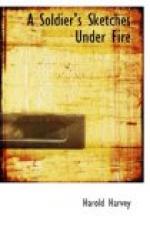“The Germans are coming—
Hurrah! Hurrah!”
The “harmony” of this stunt used to be wafted on the silent night air to the German trenches, and we soon saw how it upset Fritz and Karl. They got so annoyed that they trained their artillery in the direction of the sounds, and used to shell us all along the line in the hope of silencing our concerts. However, they could never quite locate the exact spot in which the instrument was temporarily placed.
[Illustration: “Entrenching” The piano.]
One night, while one of our concerts was at its height, the officers even joining in, the order came to advance. So we had to bid a hasty farewell to our much-prized “Johanna,” which had given us so much pleasure.
“Seventy-five hotel.”
[Illustration: Seventy-five hotel.]
Now I think of it, there was another ex-"pub” where we touched lucky in the matter of finding things—though they didn’t include a piano. This was “Seventy-five Hotel.” We called it that because the enemy fired seventy-five shells into it in seventy-five minutes on one memorable occasion, and then only killed one man. The building, which had been the scene of fierce fighting even before our battalion arrived on the scene of action, still bore the sign “Estaminet,” and so we could safely conclude that it had been the village “pub,” or wine lodge. There were a few bottles of wine still in the cellar, which the Germans must have overlooked when they were in possession, or had not time to take away. We found many articles, some useful, some otherwise; amongst them a large warming-pan, which caused amusement. The article we put to the best use was the dinner bell. This was turned to great account. In front of the estaminet was our “listening post,” where we kept watch and guard at night. Well, by aid of the dinner bell we installed our own brand of telephone system. This was to connect the bell by string to the wrists of those out on the watch. Whenever they saw anyone approaching or any other indication of possible danger they gently pulled the string, the bell tinkled, it was heard by our companions in the trench, word was passed along, and everyone prepared for emergencies.
“Chicken farm.”
[Illustration: “Chicken farm.”]
Here something really like a little bit of sport came in our way. When we arrived there the farm was deserted, its lawful owners having found the situation too hot for them. Cows roamed about at random, and so did pigs. But after we had dug ourselves in and made our position secure, the chickens were what interested us most. There were two hundred and fifty of these at the least, and they used to parade on the strip of ground shown in the picture and the bolder spirits peep over the edge of our trench. Catching them was good sport, but eating them was something




